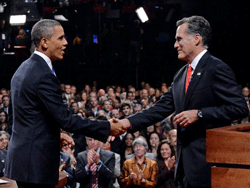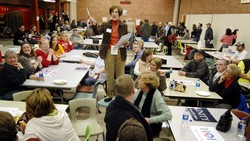After a lackluster first debate performance, President Barack Obama had a difficult task ahead of him for the second debate.
On Tuesday, October 16, Americans saw President Obama bring back the energy sought by worried members of the Democratic Party, definitely winning him the award for “Most-improved” from the first debate in Denver on October 3.
While the President appearedmore animated and his performance had improved enormously from the first debate, both President Obama and Romney’s arguments seemed overshadowed by the confrontational and argumentative nature of this debate. With a third and final debate to go, both candidates appeared likely to stand their ground and ensure their standing in an already tight race just two weeks before Election Day.
The event was sponsored by the Departments of Communication and Political Science and organized by Dr. Michael Phillips-Anderson, associate professor of communication; Dr. Joseph Patten, Chair of the Political Science and Sociology Department, and students from a variety of majors came out to attend the University’s second debate screening last Tuesday.
Students were encouraged to engage in the debate with thousands of Americans by updating their social media accounts throughout key points of the debate by using the hash tag #monmouthdebate.
This second presidential debate between Barack Obama and Mitt Romney took place at Hofstra University and utilized a town hall format – a format that features an active audience. This particular format allows the candidates to connect with voters and speak directly to the people while at the same time trying to increase likeability.
Unlike the first debate performance, each of the candidates was given a chair (rather than a podium like in traditional debates) and was expected to walk the floor and respond openly to the audience. Each candidate was given exactly two minutes to answer every question, even though time frames seem almost non-existent to the two candidates, made apparent by these first two debate performances.
The Gallup organization chose 82 uncommitted voters from the New York area to ask the candidates questions that are on the minds of American people. The moderator, Candy Crowley, CNN Chief Political Correspondent and first woman in 20 years to moderate a presidential debate, served as a guide.
Phillips-Anderson believes that it is both beneficial and detrimental to have an active-audience format in debate because even though the audience is comprised of Americans with real concerns, the subjects of the questions are still at the behest of the moderator.
Phillips-Anderson explained that as a result, the media is setting the agenda for the evening. “What is interesting is the wording of the questions. The questions are able to reveal how these people think about their issues,” he said.
Throughout the debate, President Obama and Governor Romney were posed a variety of questions from the audience, including questions about tax rates, high gas prices, unemployment, job outsourcing, oil production, gender inequality in the workforce, immigration, the attacks on the Benghazi embassy, and the availability of assault weapons.
The first question and perhaps the most relevant for college students was asked by Jeremy Epstein, a 20- year old college student who asked the candidates, “All I hear from professors, neighbors and others is that when I graduate, I will have little chance to get employment. What can you say to reassure me, but more importantly my parents, that I will be able to sufficiently support myself after I graduate?
Romney won the coin toss and answered first. He explained that the question Epstein asked is currently an important question being asked by college students and their families across America.
Students throughout the country are faced with being unable to pay back their student loans among other financial difficulties. From past experience as Governor of Massachusetts, Romney claimed, “I know what it takes to create good jobs again. I know what it takes to make sure that you have the kind of opportunity you deserve. And kids across this country are going to recognize, we’re bringing back an economy,” Romney said.
Obama agreed that the focus must be on creating good paying jobs that can support families across America. Based on that belief, Obama explained that he plans to “Build on the five million jobs that we’ve created over the last 30 months in the private sector alone.”
In order to do this, the President explained that he wants to build manufacturing jobs by changing our tax code so that companies who are investing and creating jobs in the United States will be given tax incentives, a recurring point made during Obama’s State of the Union in January.
Despite both candidates claiming their advocacy for creating homegrown jobs for all Americans focusing on college graduates in particular, neither Romney nor Obama explained exactly how they plan to achieve their goals.
College students are not the only demographic having no luck finding work. “Americans are looking at a situation where 40 percent of the unemployed have been unemployed for six months or more,” Crowley said, posing the question, “What about those long term unemployed who need a job right now?”
While 23 million people in the United States struggle daily to find a job, many of them have been out of work for a very long time, Romney explained. “The President’s policies have been exercised over the last four years and they haven’t put Americans back to work,” he said.
Claiming that the current administration has not made the progress we need to make in order to put Americans back to work, Romney believes that his five-point plan will bring back 12 million new jobs in the next four years, will get students jobs when they graduate college, and will help those already unemployed recover.
Obama countered by criticizing Romney’s plan rather than outlining his own plan to bring jobs back to America. “Governor Romney’s says he’s got a five-point plan? Governor Romney doesn’t have a fivepoint plan. He has a one-point plan,” Obama said.
Then the President placed blame on the previous administration for the state of the current economy. “And we have fought back for four years to get out of that mess. The last thing we need to do is to go back to the very same policies that got us there,” he said.
Another important question raised specifically for Romney was in regards to his plan to reduce tax rates for all tax brackets. He explained that the reason he wants middle-income taxpayers to have lower taxes is because he believes that, “Middle-income taxpayers have been buried over the past four years.” As household incomes continue to plummet, gas prices, health insurance premiums, food prices, and utility costs continue to skyrocket.
As a result, Romney wants to provide relief to middle-class families. The current administrations plan is simply not working for Americans, Romney explained, and that is why he plans to get us on track to a balanced budget.
Obama countered with a similar approach of reducing taxes for the middle class, but argued that, “if we’re serious about reducing the deficit, if this is genuinely a moral obligation to the next generation, then in addition to some tough spending cuts, we’ve also got to make sure that the wealthy do a little bit more.”
However, rather than explaining his own plan to reduce taxes for middle-class Americans, he bashed Romney’s philosophy. According to Lexi Todd, a senior, political science major, and debate team captain at the University, said this technique is often a common strategy in debates.
“The technique, referred to as ‘Ad hominem,’ attempts to negate the truth of a claim by attacking an opponent’s character, a negative characteristic, unrelated belief, or appearance rather than focusing on the question being posed in the first place.”
Like in negative attack ads, “Ad hominem” usually involves insulting or belittling the other opponent in order to invalidate their argument, Todd explained. As a result, this argument ultimately is not logical because it relates to the opponent’s character rather than the logic behind the argument being made.
Todd said both candidates left a lot of America’s questions unanswered. She expressed, “Also, the candidates were constantly impolite toward each other, which could ultimately hurt their likeability ratings – something that neither candidate can afford this late in the campaign.”
Although the audiences questions rose important points based on issues, Michael Jones took a different route. Jones, who voted for Obama in 2008, said he wasn’t optimistic about the current state of the country, and asked “What have you done or accomplished to earn my vote in 2012?”
Defending his accomplishments, President Obama explained that four years ago, he told the American people what he would accomplish and how he succeeded. Among these accomplishments, he concluded, were cutting taxes for middle class families and for small businesses, ending the war in Iraq, refocusing attention on our attackers on 9/11, went after Al Qaeda and took down Osama Bin Laden, created five million jobs, and saved an auto industry on the brink of collapse.
Romney quickly jumped on the defensive by saying that despite Obama’s supposed accomplishments, many of his promises made at the start of his administration were promises that he simply couldn’t keep. “This is a president who has not been able to do what he said he’d do. He said that he’d cut in half the deficit. He hasn’t done that either. In fact, he doubled it,” Romney said.
Reigniting a common fear in many Americans, Romney warned the American public by saying, “I can tell you that if you were to elect President Obama, you know what you’re going to get. You’re going to get a repeat of the last four years. We just can’t afford four more years like the last four years.”
Obama wasn’t the only contender being faced with a question that examined his character. Another undecided voter explained their disappointment with the lack of progress made in the last four years, however explained that a large percentage of their disappointment stems from the failings of the Bush administration.
Fearing that Romney will return to the policies of his Republican counterpart, the voter asked, “What is the biggest difference between you and George W. Bush, and how do you differentiate yourself from George W. Bush?”
Romney made clear that not only are he and former President Bush different people, but that this is a different time in our nation’s history. For example, he explained that by virtue of new technology, we are able to get much of our energy from North American soil, rather than looking to other countries. This was not a possibility when Bush was in office.
Some other points Romney made were that unlike Bush, if elected, he would crack down on China and expand trade in Latin America. He would work diligently to get us on track to a balanced budget, champion small business thus making more jobs, and do away once and for all with Obamacare.
One of the most controversial points made throughout the debate and on the mind of millions of Americans, is centered on President Obama and his crisis management after the attack in Benghazi.
While Romney insisted that the President did not announce for another two weeks that the event was an “Act of terror,” Candy Crowley broke out of her role as moderator when she spoke up during a heated exchange between President Obama and Romney over whether the President named terrorism as the cause of the deadly attack on the U.S. consulate in Benghazi on the anniversary of September 11th.
However, even though Crowley confirmed that President Obama did use the words “Act of terror,” it is unclear whether or not President Obama spoke directly about the attack in Libya that day in the Rose Garden.
Obama’s statement from the day after the attacks were controversial and vague in the eyes of many Americans and news outlets: “No acts of terror will ever shake the resolve of this great nation, alter that character, or eclipse the light of the values that we stand for.” Although it’s confirmed that Obama referred to “Acts of terror,” he did not come out and clearly say that terrorists had attacked our nation until 14 days after the attack.
According to Phillips-Anderson, “There was no slam dunk winner in this debate, but I would give a solid win to the President.”
“He rebutted many of Governor Romney’s points and did a better job connecting with the citizens asking questions. Romney did about as well as he did in the first debate, but getting flustered on the Libya question revealed that he could be knocked off balance,” he explained.
Similar to Todd, Phillips-Anderson believes that each candidate did a better job at criticizing the other candidate for not being truthful than they did at detailing their own plans. “Both candidates are in difficult positions. President Obama can’t advocate anything radically new without people asking why he isn’t already doing those things. Gov. Romney can’t provide serious details to his plan without risking votes. So we get platitudes and generalizations,” Phillips-Anderson said.
The final debate focused around foreign policy and took place on Monday, October 22. The Outlook will be reviewing that debate next issue. Stay tuned.
IMAGE TAKEN from www.garrentt.com



